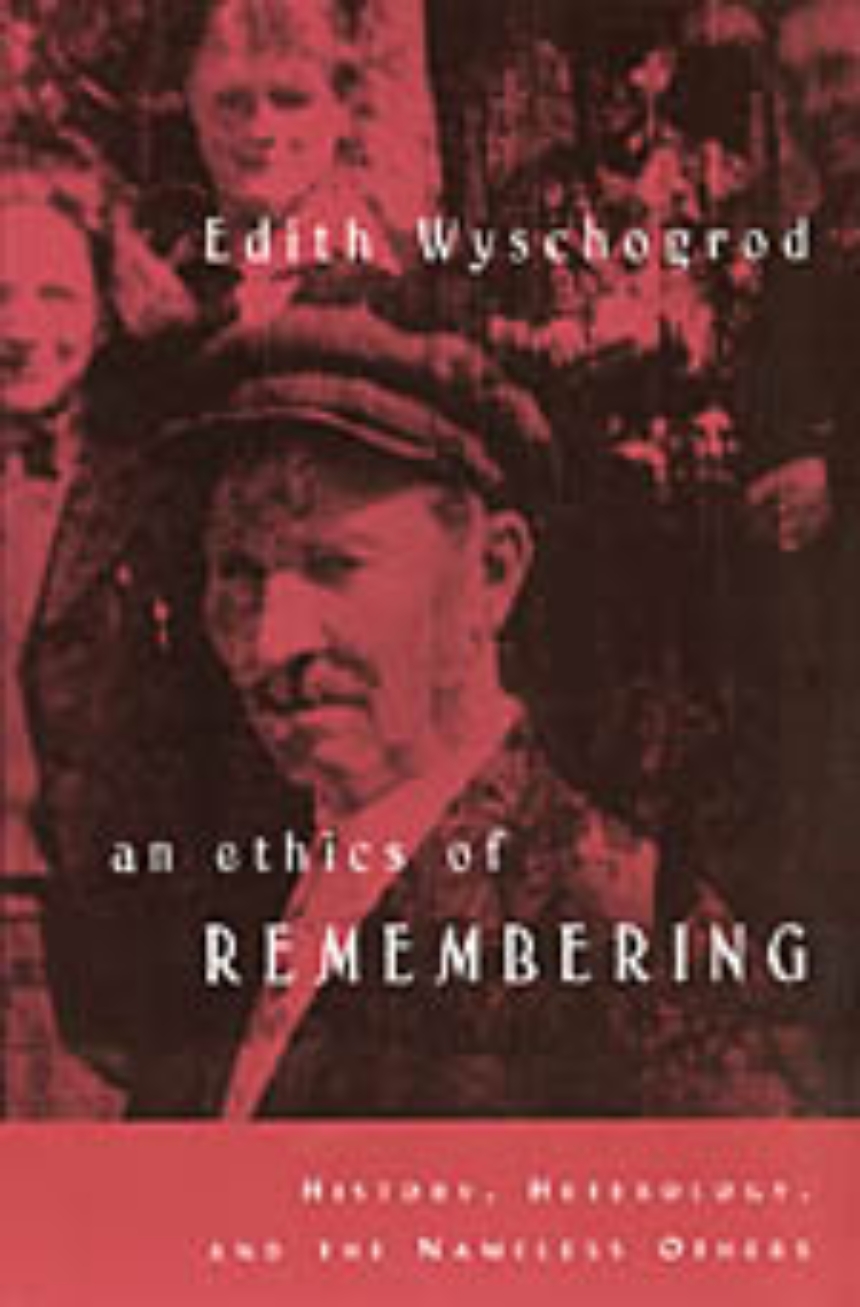An Ethics of Remembering
History, Heterology, and the Nameless Others
What are the ethical responsibilities of the historian in an age of mass murder and hyperreality? Can one be postmodern and still write history? For whom should history be written?
Edith Wyschogrod animates such questions through the passionate figure of the "heterological historian." Realizing the philosophical impossibility of ever recovering "what really happened," this historian nevertheless acknowledges a moral imperative to speak for those who have been rendered voiceless, to give countenance to those who have become faceless, and hope to the desolate. Wyschogrod also weighs the impact of modern archival methods, such as photographs, film, and the Internet, which bring with them new constraints on the writing of history and which mandate a new vision of community. Drawing on the works of continental philosophers, historiographers, cognitive scientists, and filmmakers, Wyschogrod creates a powerful new framework for the understanding of history and the ethical duties of the historian.
Edith Wyschogrod animates such questions through the passionate figure of the "heterological historian." Realizing the philosophical impossibility of ever recovering "what really happened," this historian nevertheless acknowledges a moral imperative to speak for those who have been rendered voiceless, to give countenance to those who have become faceless, and hope to the desolate. Wyschogrod also weighs the impact of modern archival methods, such as photographs, film, and the Internet, which bring with them new constraints on the writing of history and which mandate a new vision of community. Drawing on the works of continental philosophers, historiographers, cognitive scientists, and filmmakers, Wyschogrod creates a powerful new framework for the understanding of history and the ethical duties of the historian.
Table of Contents
Illustrations
Acknowledgments
Prologue
Abbreviations
1: Re-signing History, De-signing Ethics
The Historian’s Promise
Historical Truth and the End of Representation
The Necessity of Naming
That Which Cannot Be Named: The Cataclysm
Historical Narrative
History as Science: L’Esprit de Geometrie et L’Esprit de Finesse
Factuality Revisited: Lies, Fiction, Ficciones
Ficciones and History: Foucault
2: Reading the Heterological Historian Reading Kant
The Nihil and Analogy
Heteronomy’s Rule
The Ends of History
The Aesthetic and the Cataclysm
3: The Historical Object and the Mark of the Grapheme: Images, Simulacra, and Virtual Reality
Runaway Images
The Historian and the Camera: Still Photography
The Co-optation of the Look
History as Archive of the Moving Image
The French Revolution in Narrative and Film
Images and Information
4: Wired in the Absolute: Hegel and the Being of Appearance
The Specular Absolute and Release from the Object
Plenum and Void
Terror and Cataclysm
5: Re-membering the Past: The Historian as Time Traveler
Voyages in Time
Time’s Duality: From Hegel to Nietzsche and Back
McTaggart’s Paradox: Tensed and Tenseless Time
The Speech and Silence of Heterology
6: Re-membering the Past
The Tablet and the Aviary
"That This Too Too Solid Flesh Would Melt"
From "Trace" to Shining Trace
Flickering Memories: Images and Signs
La Cage aux Folles: From Tablet to Aviary and Back
The Mind Is a Bone: Skull, Brains, and Memory
Matter Matters: Brain States and Mental Acts
Differance Is in the Neurons
Ownerless Memories: Artificial Life and Biological Computers
7: The Gift of Community
Unsaying Rational Community: Autochthony and Desire
Humanity’s Essence Is Production
Exteriority and Community
The Gift of the Future
The Gift of Hope
Notes
Index
Acknowledgments
Prologue
Abbreviations
1: Re-signing History, De-signing Ethics
The Historian’s Promise
Historical Truth and the End of Representation
The Necessity of Naming
That Which Cannot Be Named: The Cataclysm
Historical Narrative
History as Science: L’Esprit de Geometrie et L’Esprit de Finesse
Factuality Revisited: Lies, Fiction, Ficciones
Ficciones and History: Foucault
2: Reading the Heterological Historian Reading Kant
The Nihil and Analogy
Heteronomy’s Rule
The Ends of History
The Aesthetic and the Cataclysm
3: The Historical Object and the Mark of the Grapheme: Images, Simulacra, and Virtual Reality
Runaway Images
The Historian and the Camera: Still Photography
The Co-optation of the Look
History as Archive of the Moving Image
The French Revolution in Narrative and Film
Images and Information
4: Wired in the Absolute: Hegel and the Being of Appearance
The Specular Absolute and Release from the Object
Plenum and Void
Terror and Cataclysm
5: Re-membering the Past: The Historian as Time Traveler
Voyages in Time
Time’s Duality: From Hegel to Nietzsche and Back
McTaggart’s Paradox: Tensed and Tenseless Time
The Speech and Silence of Heterology
6: Re-membering the Past
The Tablet and the Aviary
"That This Too Too Solid Flesh Would Melt"
From "Trace" to Shining Trace
Flickering Memories: Images and Signs
La Cage aux Folles: From Tablet to Aviary and Back
The Mind Is a Bone: Skull, Brains, and Memory
Matter Matters: Brain States and Mental Acts
Differance Is in the Neurons
Ownerless Memories: Artificial Life and Biological Computers
7: The Gift of Community
Unsaying Rational Community: Autochthony and Desire
Humanity’s Essence Is Production
Exteriority and Community
The Gift of the Future
The Gift of Hope
Notes
Index
